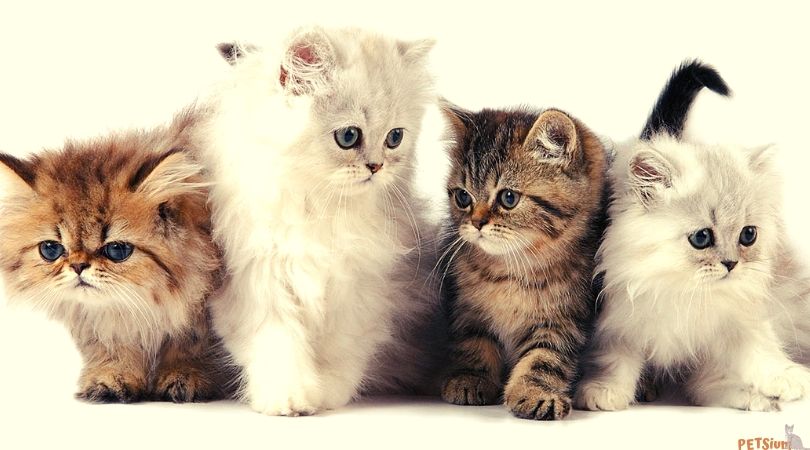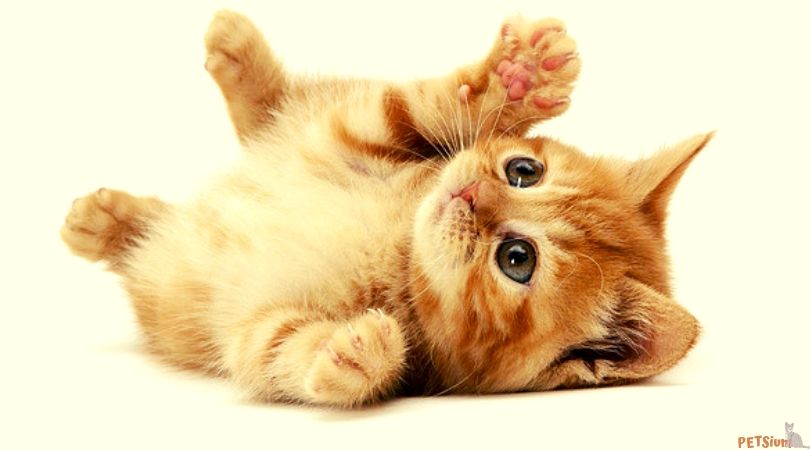Cats are carnivores and rely on the nutrients, vitamins and minerals contained in animal tissues to ensure that their specific nutritional requirements are met. Cats living in their natural habitat consume prey that is rich in protein and with a moderate amount of fat and low concentrations of carbohydrates. Their bodies are naturally adapted to need fewer carbohydrates and to metabolise protein faster than dogs and other omnivores.
Consequently, it’s important that kittens get the correct balance of proteins, carbohydrates, fats, minerals, vitamins, and water in their diet. During the first few months and years of your cats life their body is busily growing and developing, without good nutrition they risk severe health issues later in life. By ensuring that all the dietary components are well balanced, your kitten can develop and mature into a happy, healthy cat.
Commercial Kitten Food
The most convenient way to make sure that your kitten is getting a well balanced diet is through commercial kitten food. Pet food manufacturers produce food that will meet the nutritional needs of kittens without any additional supplements. When you’re selecting a commercial kitten food product, check the labelling to ensure that it states that it’s a ‘balanced and complete nutrition’. These declarations are regulated by state and federal agencies to guarantee their accuracy.
Balanced and complete kitten food is sold in three main forms: canned, dry and soft-moist. They will all contain the same essential nutrients; the main difference is in the amount of water they contain. Generally, dry foods are more economical, while canned foods are often more palatable.
Unless directed by your veterinarian, it’s important not to add any additional vitamins or mineral supplements into your kitten’s diet if you are feeding them commercial food that guarantees a balanced and complete diet. Excess minerals and vitamins can lead to skeletal problems, kidney stones and other serious ailments.

How Often do You Feed a Kitten?
As your kitten grows the amount of food required will also alter. Commercial pet food labels will typically provide guidelines on how much to feed your kitten as it matures. These labels will include estimates based on several different weight ranges. It’s a good idea to follow these guidelines when you first start using a certain brand of food and you can adjust it accordingly once you better understand your cat’s individual energy requirements.
Kittens have steep growing curves and their energy demands increase rapidly and its necessary adjust their daily food intake accordingly.
Free-choice Method of Feeding Kittens
If you have a kitten that is struggling to gain weight or is growing slowly you should use the free-choice method of feeding. This helps to reduce gastric distension that can occur when a kitten eats too rapidly. Free choice feeding is not recommended for kittens that are overweight or obese. Also, it’s important to bear in mind that neutered cats are at a higher risk of obesity and free choice feeding should be done cautiously.
The feeding frequency for meal-fed kittens six months old or younger should be three to four times a day. Once your kitten reaches six months old they are generally happy to be feed only twice a day. Most commonly, the transition towards an adult diet should start when your kitten is twelve months old. Kittens should always have access to fresh, clean drinking water. Often kittens prefer shallow water and food dishes, especially breeds that have ‘flat faces’, such as Persian cat.
If you do change your kitten’s diet, make sure that you do so using a slow transition over a period of approximately a week. Immediately replacing one diet with another can create gastrointestinal upsets or the refusal to eat. Start by replacing a small portion of the meal with the new food and gradually build this up until the new diet is introduced.
Always store unused can food in the refrigerator to maintain quality and try to bring it to room temperature before feeding it to your kitten as this will help to prevent stomach upsets. Dry food should be kept in a dry, cool location and any food that hasn’t been eaten within six months should be discarded.

Homemade Kitten Food
You can feed you kitten homemade diets if you prefer. However, ensure that the meals are prepared based on recipes that have been designed by a nutritionist to ensure that they are complete and well balanced. Be cautious of raw meat as it’s a potential source of pathogenic bacteria and parasites.
Also, while eggs are a great protein source, raw eggs can reduce the absorption of vitamin B and lead to coat and skin problems. Regular meals of raw fish should be avoided as can create a deficiency in thiamine (a B vitamin) and lead to a reduction in appetite and can cause seizures; in some extreme cases it can cause death.
Investing in good nutrition from the start of your kitten’s life will reduce the likelihood of your beloved pet developing obesity problems and other debilitating ailments that can be easily avoided with the correct diet. Ensuring that your kitten has a complete and balanced diet will set them up for a long and healthy life.
Best Kitten Food
Kitten food is obviously an product that we would want to choose wisely for the benefit of our little friend’s health and happiness. The fact is that choosing the right food is not easy as there are several brands for different types of kittens as well as having different nutritional values. There are many important factors to consider when choosing the best kitten food.
When you purchase kitten food, you most DEFINITELY want to avoid buying adult cat food. You wouldn’t feed you 5 or 6 month old child some spicy spaghetti that you made; instead you’d feed her baby food, according to her age. Just like human, a kitten’s digestive system is not developed well enough to be able to handle harsher foods that older cats would be eating.
Also, avoid any foods that contain any types of byproducts, for the same reason — digestion.

Kittens Nutritional Needs
Kitten food has a lot more nutrients that a growing kitten needs to develop properly. You should always read the ingredients and look for the first ingredient that has to be some sort of meat product, such as chicken or veal. Kittens need a lot of protein to help them develop their organs and muscles. It’s important to choose the food that made from good protein sources and avoid cheap protein sources that may not be digested by your kitten.
In addition, the best kitten food should contain complete vitamin and mineral profile as they are essential part of helping a kitten to grow into a strong, healthy adult feline. Make sure there is no artificial ingredients, colors and preservatives in the food.
Dry or Canned Food for Kittens
There is a common misconception that dry food is better for ANY animal’s digestive system, but quite the contrary, canned food holds better nutritional value.
Allow me to explain: All foods for kittens contain a percentage of moisture (empty calories). Let’s imagine taking all of the moisture or water out of dry food. Say there is 10% moisture that we omit, leaving the “dry matter” at 90%. If the most important ingredient, protein, is 20%, then you can divide that 20% by the 90% to get 22%, protein per pound of dry matter.
Now with canned kitten food, there’s obviously more moisture or water than dry matter. If there is 80% moisture or water and 20% dry matter and 5% protein, calculate the canned food the same way; 5% protein divided by 20% would be 25% protein per dry matter.
Since the canned food provides more protein per pound of dry matter than does the dry food, the canned food although better in nutritional quality, is actually less expensive, per pound as well. So, “getting what you pay for” isn’t always bad!

Here are some recommended food brands for your kitten:
KMR Kitten Milk Replacer — For orphaned or rejected kittens. This is much similar to the human infant formulas that we give to the children when they’re not nursing from their mothers.
BLUE Healthy Growth — For extra pleasurable flavor. This product offers a very nutritional “Chicken and Brown Rice” flavored formula.
Royal Canin Babycat Instinctive — If you’d prefer to give your kitten canned (moist) food as opposed to dry food.
You should compare different products and choose kitten food only from trusted company. Do not forget to browse for more information and reviews from other kitten owners. So you will be able to find the food that least expensive and still the best in nutritional value for your kitten.
Dry Kitten Food
Dry kitten food should be high in protein and fat to help meet the needs of your growing pet. You will find that many of the value brands are high in grains and other fillers that may not be beneficial to your pet’s health. Some whole grains and vegetables are okay for your kitten to eat but cats are carnivorous making quality meats the ingredient of choice.
Ash content is another issue and too much of this in your kitten’s food may result in urinary tract infections. Ash is a byproduct of the cooking process but higher quality meats will not contain as much ash from cooking as the lower quality meats often found in value foods.

Organic Kitten Food
You can even find organic dry kitten food for those who want to give their cats the best possible dry foods. You may choose to supplement their dry food with a small serving of moist food once a day but the wet food should not be left out as it may go bad. Dry cat food is the most convenient choice for many families that are constantly on the go and it may be left out for your cat or kitten to eat whenever they are hungry.
Turkey, chicken, beef, and assorted fish ingredients are all popular choices and some brands use several of these in their dry food recipes.
You may also want to look for dry kitten food that does not contain high amounts of chemicals that may be used for preserving the cat food. Quality brands may not have any unnatural preservatives making them a great option for those who want to keep their cat food as natural as possible.
Most organic brands will fall into this category while keeping additives out of the meat and vegetable products that are being raised to make these foods as well. Antibiotics, hormones, growth supplements, and other chemicals may be used to raise livestock or grow crops and there is much speculation at the health risks associated with these additives.
Talk to Your Vet
Taking some time to talk to your vet about his or her recommendations regarding healthy or organic cat and kitten food is always a good idea. Your vet may also be able to tell you what ingredients you should avoid at all costs. This can be helpful when you are researching the different brands available.
High quality ingredients may cost more but you will also not be paying for fillers and chemicals that are used for many value brands. You should look for the dry kitten food that has the highest quality ingredients while still falling within your budget restrictions.